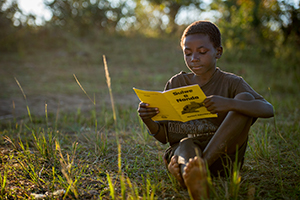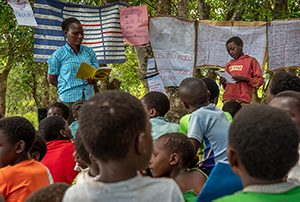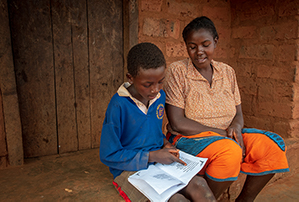 |
| Lightwell is engrossed in reading his book while sitting in a sun-drenched field. (©2018 World Vision/photo by Laura Reinhardt) |
What would your life be like if you never learned how to read? If these words appeared to you as unintelligible scribbles, a language you didn’t understand? How would you read a prescription? Or a stop sign? For approximately 56% of elementary-aged children — 387 million around the world — this is their reality as they do not meet minimum reading proficiency standards.
Every year on Sept. 8, we recognize International Literacy Day and the critical role reading plays in daily life. Education is at the heart of sustainable development; without education, it’s nearly impossible to break free from poverty.
An outbreak of reading increases literacy
Lightwell Mboyonga goes everywhere with a book in his hand. The 10-year-old living in Moyo, Zambia, attends World Vision’s reading camp, held on weekends.
“My favorite thing is reading,” Lightwell says. “I like it even more than football (soccer).”
His uncle, Thomas Mambo, 45, has volunteered as a “caregiver” to help look out for children in Moyo since 2009, when World Vision started child sponsorship in the community. So he helps regularly monitor children’s health and well-being. Thomas says that in Moyo, “there has been an outbreak of reading. Children read everything they get their hands on.”
That’s true of Lightwell. As dozens of his friends kick around a soccer ball made of plastic bags, Lightwell is immersed in a book, oblivious to the happy chaos around him.
 |
| Jenara Mumbulu is a farmer during the week. But on Sundays, as a volunteer trained to teach Reading Camps she teaches children to read. |
Reading camp starts in the first grade. “The first grade is the foundation of everything,” says Shepherd Chilombe, 48, who runs the program. “You can’t move forward if you don’t know how to read.”
Shepherd is a local expert who has trained members of Zambia’s Ministry of Education on how to educate community members — farmers, shop owners, and even teachers — in a new way of teaching.
In Moyo, students gather under trees and open fields. Lessons are interspersed with games. Teachers focus on individual children. Posters blow in the soft breeze, hanging from tree limbs with pictures that illustrate words in Tonga, the local language. The children sing their vowels: A, E, I, O, U, becomes A, E, I, O, moo when a cow passes by, drowning out the final vowel.
“Any child can go to the reading [camp] — both sponsored and nonsponsored,” says Shepherd. Shepherd, who remembers struggling to read, is now helping thousands of kids like Lightwell.
Lightwell’s mother, Lillian, 27, says her children love World Vision’s reading camp. She’ll do anything to support her children, yet says she faces one challenge: “[My children] want me to approve their homework. But I don’t know how to read.” Thankfully, this will soon change.
 |
| Lightwell reads to his mother Lillian. (©2018 World Vision/photo by Laura Reinhardt) |
World Vision is starting a reading program for adults in Moyo, and Lillian will be first in line. “My greatest joy would be to read to the congregation,” she says. And she’ll be able to study with her son.
Lightwell wants his mother to read like he can. He hopes to become a teacher one day. “I will teach the children the way I am learning at reading camp,” he says.
Lillian is proud of her son. “I never went to school. But my child is able to read,” she says. “His future is guaranteed.”
Pray with us to help ensure that every last child, like Lightwell, has essential educational skills like literacy and a safe environment for the chance to fulfill their God-given potential.








